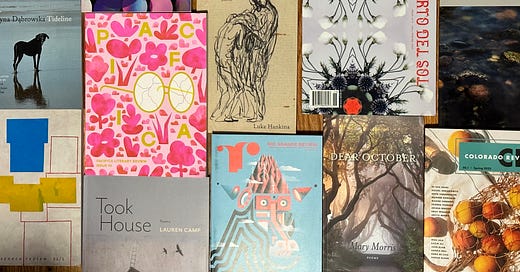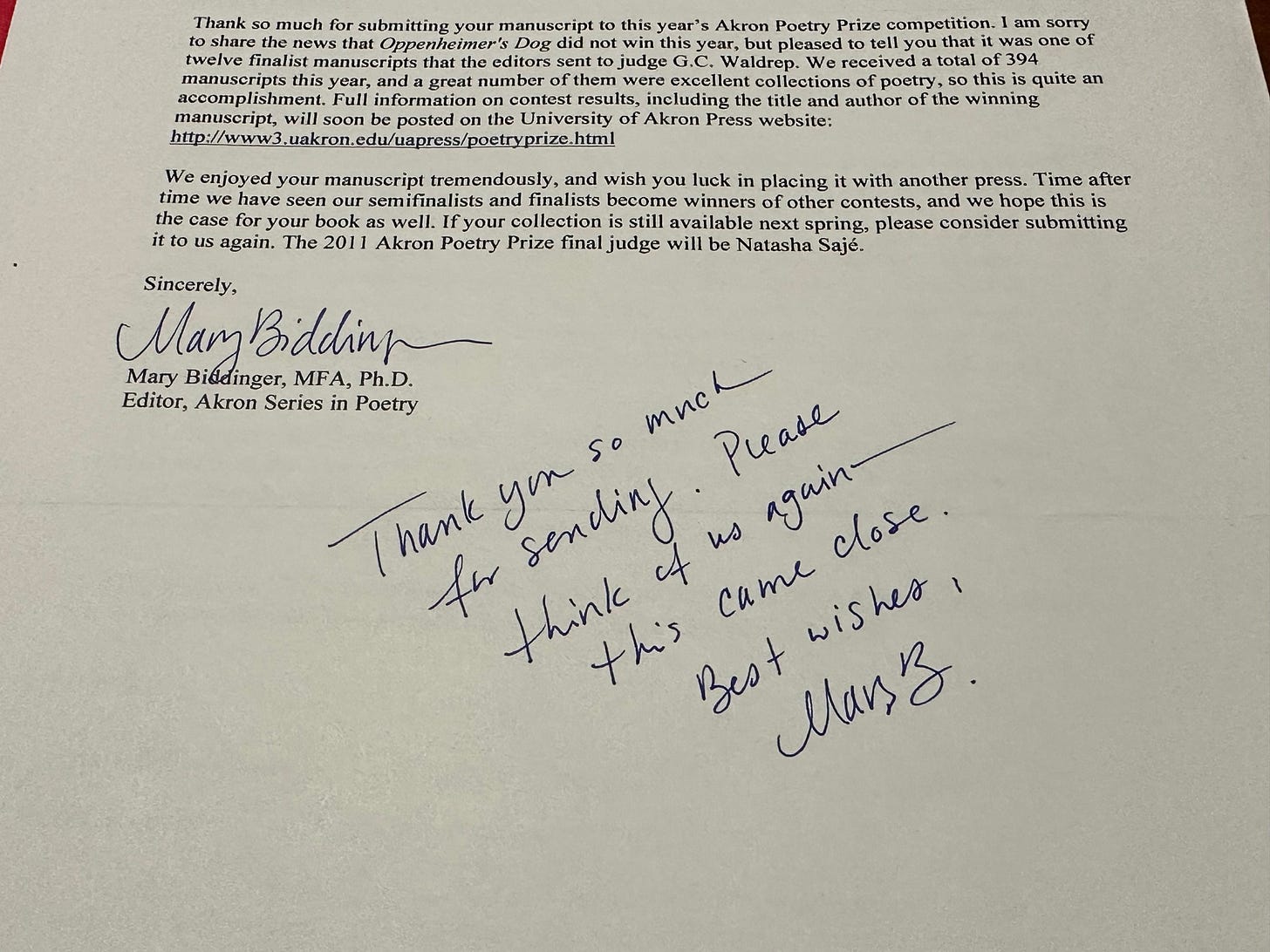4 Big Takeaways from AWP23
Poetry publishing trends, promotion strategies, and post-pandemic vibes.
A few months ago, I polled writer friends about AWP23, which happened in Seattle last week. Were they going? I got a few hesitant yeses and some very strong nos. OK, I thought. I’m not going! I hate crowds. I hate schmoozing. AWP is overwhelming, underwhelming, agitating.
Then I decided to go, mostly because one of my longest and dearest writing companions offered to share her hotel room and because other beloved writing friends were going, too. I couldn’t pass up the opportunity to be in their company. I also wanted to get a fresh take on the literary publishing landscape.
Fellow Lighthouse Writers Workshop teacher Steven Dunn summed up the conference pretty well, I thought: “This year I gave AWP one more ambivalent, skeptical shot, and I was wrong. That shit was so much fun, and I’d definitely go back … mostly I had to change my thinking from AWP having to be about myself and my lil books (that idea is common for how AWP gets talked about), and realize it’s a cool place to kick it with my homies, see some readings, and listen to smart people talk about shit they love, which means I get to learn some shit too.”
I totally agree. AWP’s value isn’t in its hugeness or in the potential for book promotion—the dozens of panels every hour, scads of off-site readings every night, acres of books at the book fair. It’s in the accidental meetings, small moments of connection, serendipities.
Here are a few of my big takeaways from AWP23.
Poetry publishers abound.
This year, Copper Canyon celebrated its 50th year with headlining readings plus the release of an anthology A House Called Tomorrow: 50 Years of Poetry.
And I was happy to see so many university presses still going strong. I was even more excited to see so many independent book publishers that have started up in the last 10 years or are now in a second decade and actively growing their lists.
Though the financial side of independent publishing remains a challenge, publishers are finding ways to raise funds (such as Kickstarters and grants) to publish emerging and seasoned authors alike.
Literary journals are growing digital presences, and not just because the cost of printing has proved prohibitive for many journals. They’re excited to publish cross-genre work incorporating art, images, sound, and video.
In book publishing, too, publishers are showing increasing interest in hybrid, visual, experimental work. It’s a great time to be working in creative ways on the page or for the screen.
Build community before you have a book.
I attended two panels on book promotion, which largely centered on how marketing and promotion seems permanently changed. Support for book tours, readings, and other live promotion activities remains diminished. Virtual events, self-funded tours, and other ways of reaching readers—such as newsletters and podcasts—are growing.
The authors on these panels underscored that successful promotion starts long before the book is launched. It starts with building genuine connections with readers slowly, over time, in the years leading up to publication.
That doesn’t mean you need a huge blog following or social media presence. And it certainly doesn’t mean broadcasting all the time about your own accomplishments. Just the opposite. They recommend shining a light on others’ work, curating journals and books for friends. I’ll add: Start a reading group or a reading series. Teach a class at your local library.
Bottom line: Forget the big-stage-bright-lights promotion dream. Do what’s in reach that comes naturally, and don’t underestimate the exponential power of being a kind, generous literary citizen.
The power of connection.
Maybe I’m just desperate for human interaction after the last three years, but I felt the same last time I attended AWP eight years ago. It was all about 1:1 connections.
What a joy to meet editors and writers who I’d known previously only through email or, in some cases, through old-fashioned letter correspondence. I stopped by the Akron University Press table to thank them for Marbles on the Floor (see my interview with coeditor Sarah Giragosian). I chatted with Akron’s poetry editor, Mary Biddinger, who—as I confirmed in my files after AWP—sent me this kind note in 2010 when my manuscript was a finalist for the press’s poetry book contest.
That manuscript was an early version of Bloodline, which was published in 2017 and went on to win the New Mexico Book Award in 2018. Mary’s early encouragement meant so much to me.
And I was so happy to support books and readings by friends. [Note: I missed too many readings and gorgeous books to count. Please forgive me!]
New connections were just as delightful. A young poet, Ricardo Ruiz, pulled me out of the aisle to tell me about his collection We Had Our Reasons, about “the thoughts and struggles that come with the decision to leave one’s home in Mexico and travel to a remote, rural community within the United States.” I’m thrilled he did.
Just one slice of a bigger pie.
Finally, it may go without saying but it’s important to remember that AWP is just one segment of a much larger literary education and publishing landscape.
Forever, AWP has largely supported the literary activities of academic institutions. Maybe that’s why the vibe feels so hierarchical at times; the academic path is high pressure. I get it. Writers need to publish to get tenure. Writers need to prove their worth. But that paradigm doesn’t seem to be making anyone happy.
As a younger writer, I was less aware of the large number of conferences and communities and publishers that exist outside of the AWP segment. Scant community writing programs had booths at this year’s conference; many I know did not—Lighthouse Writers Workshop (where I teach) and Poets House in NYC, where I was just a couple weeks ago, did not, just to name two.
Truly, you don’t need to go to AWP to be a part of the vibrant literary landscape across the U.S. Thank goodness for that.
Upcoming Events / Poet to Poet Community
The Poets Circle: Drop-in Conversations
APRIL: Weaving the Thread—On Coherence
Apr 5, 6-7pm MT & Apr 19, 12-1pm MT
How do you cultivate coherence in your work? How do authors you admire create coherence in their work, across poems?
MAY: Flow & Modulation—On Variation
May 3, 6-7pm MT & May 17, 12-1pm MT
How do you invite variation into your work? How do the authors you admire work with the principle of variation?






Thank you for bringing us a report from AWP. Seeing so many photos of poets whose work I love, and who are genuinely fine people, caused me to regret I didn't go. Next year!
I'm new to PTP. Thanks Radha for providing this nurturing platform. AWP '23 was my first, and yes, while I dislike crowds and large cities, it was the "accidental" meetings that moved me most.